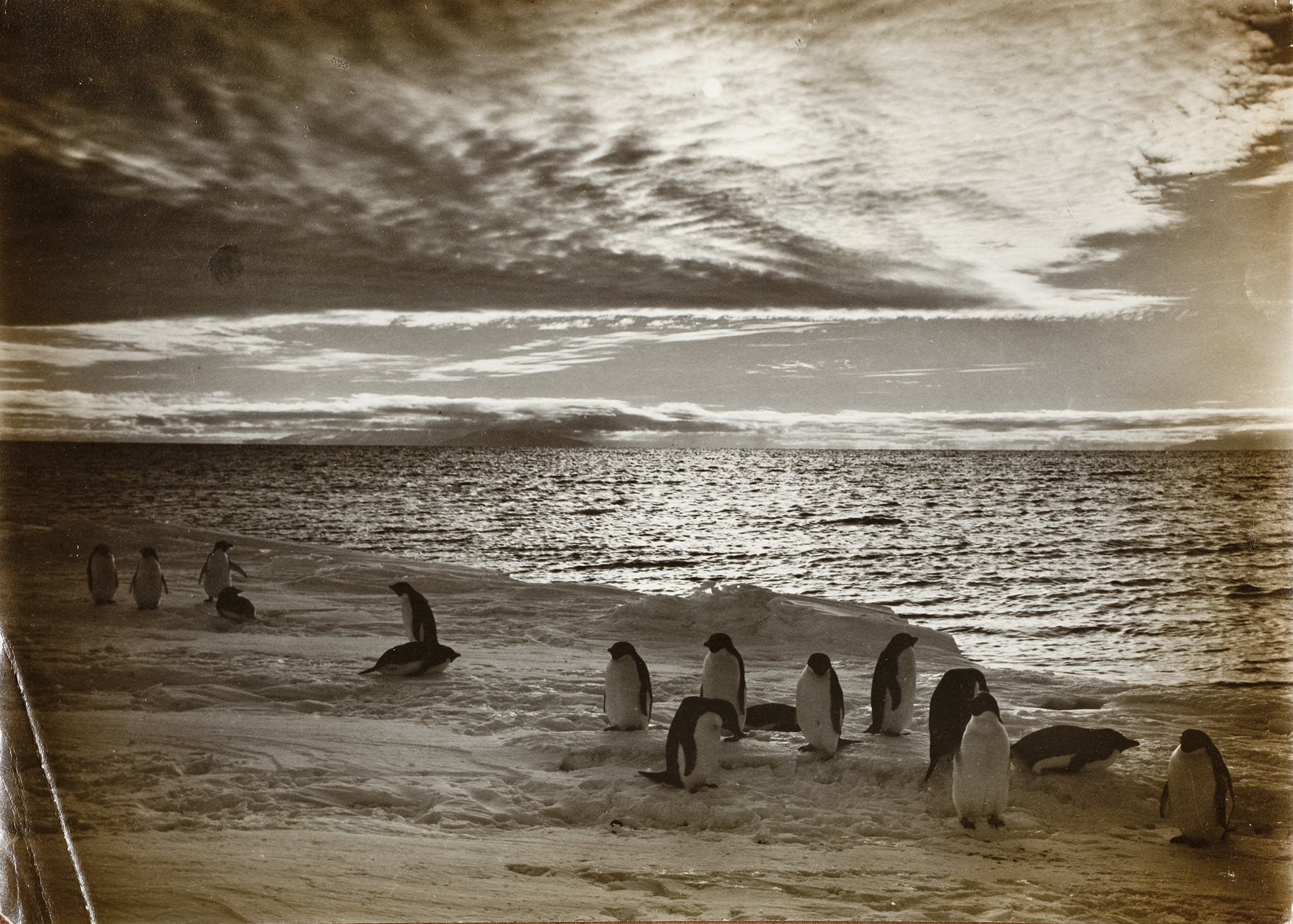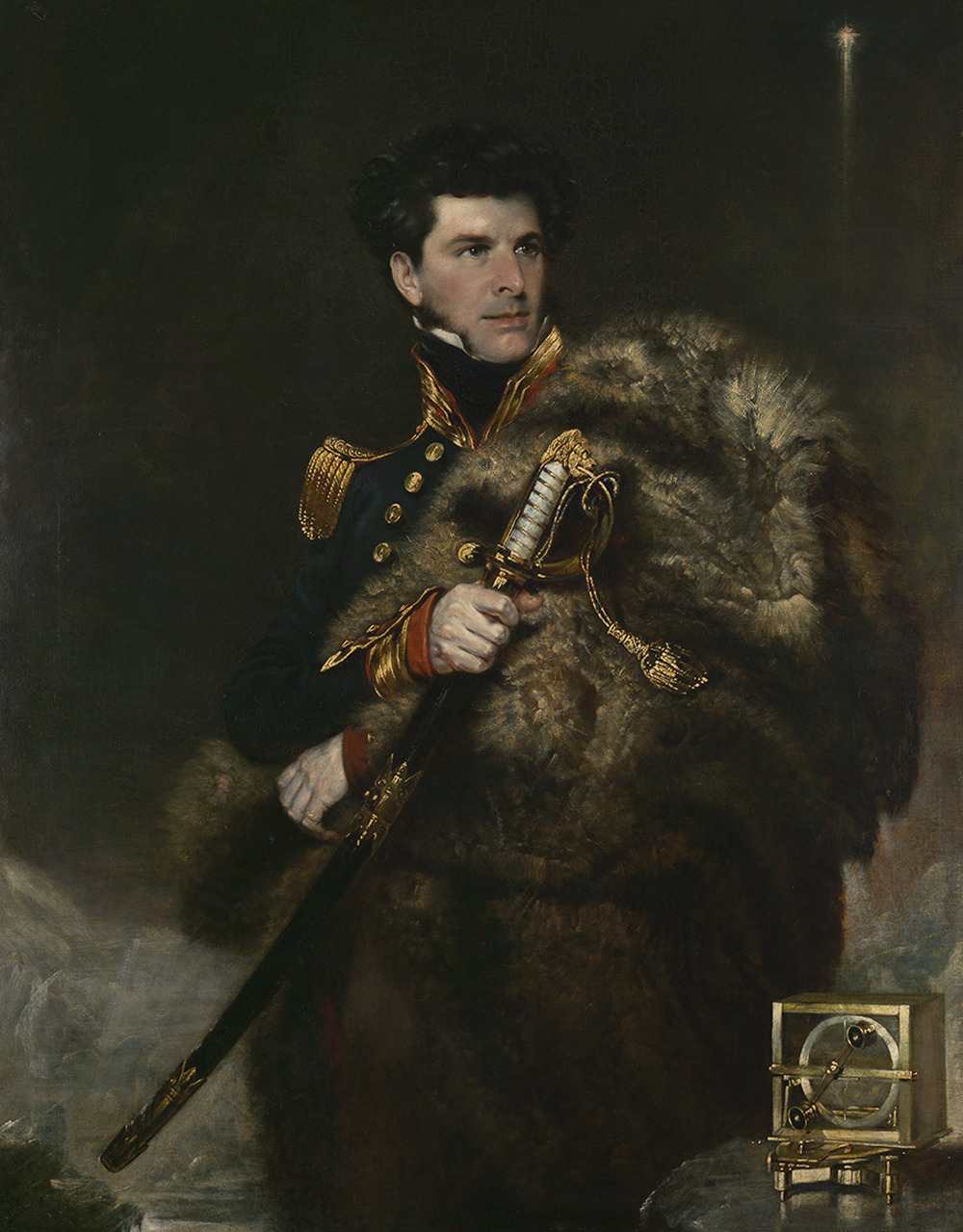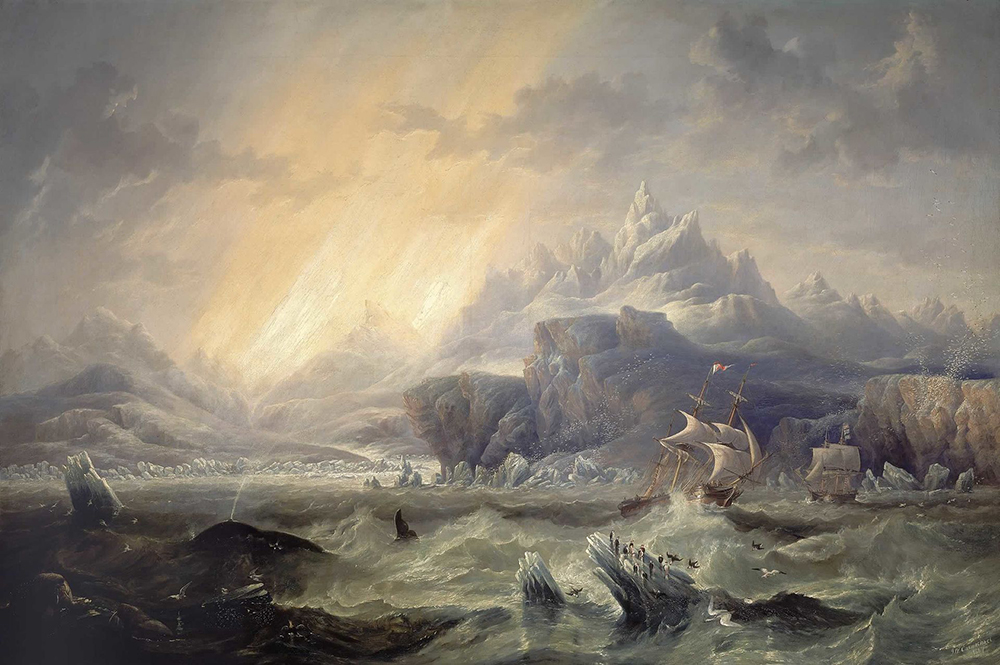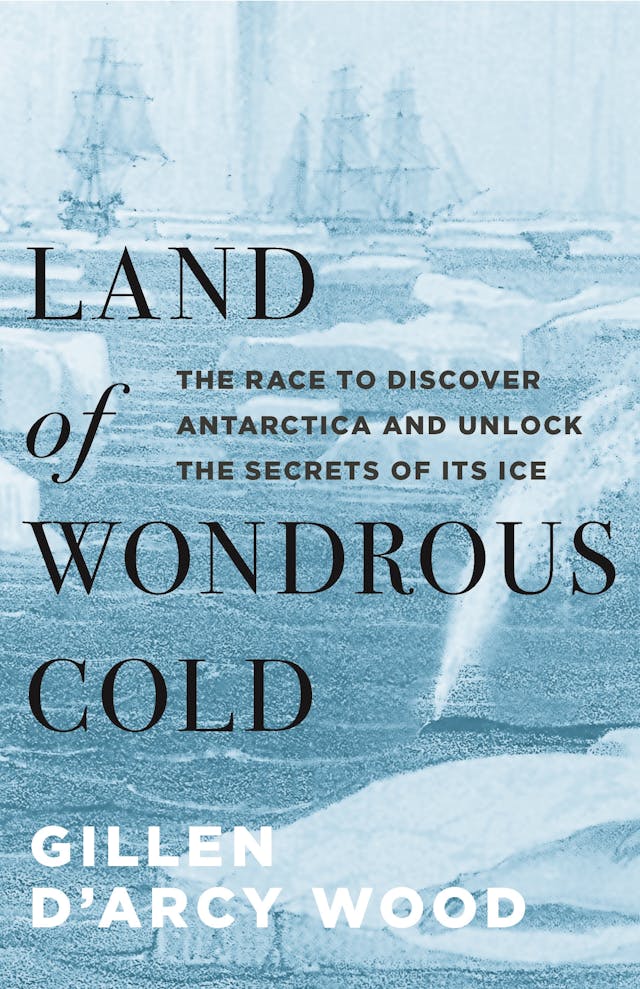
Midnight Sun & Penguins, by Herbert G. Ponting, c. 1911. Los Angeles County Museum of Art, The Marjorie and Leonard Vernon Collection, gift of the Annenberg Foundation, acquired from Carol Vernon and Robert Turbin.
A decade before his maiden voyage to Antarctica, James Clark Ross was already the most experienced polar explorer alive. Then in his mid-twenties, he had spent a third of his life on the northern ice. He had learned the language of the Inuit people and how to manage a sled with dogs. In the middle of May 1831, he led a sledding party to plant the British flag at the North Magnetic Pole.
His small band came to a stretch of low ground near the water. They had reached 82° north, at a point farther west in the Arctic than any previous expedition. Inland, a mile distant, the beach rose to a low line of sandy ridges. Here Ross took out his dipping needle, careful with his numb hands. When released from its horizontal position, the needle swung with total confidence in a 90° arc, pointing down to his feet. The built-up anxiety of the two-year Arctic voyage—and five days of raw suffering on the march—melted away. The fact that he and his men had not eaten for twenty-four hours—with their food another long day’s trek away—was forgotten. Standing at the North Magnetic Pole, James Ross felt a transcendent happiness.
Some had expected the party to find a great mountain of iron at this geographically momentous spot, or a giant magnet the size of Mont Blanc. But Nature had chosen not to advertise the locus of her “great and dark powers.” It was as bleak a place as could be imagined, without food, fresh water, or vegetation. The rude Earth. Notwithstanding, they raised the flag at the magnetic pole and gave three cheers for King George, not realizing he was dead. In that moment, James Ross’ geographical destiny—to become the first man to stand at both ends of Earth—was marked. As the Royal Society put it, “It is not to be supposed that Captain Ross, having already signalized himself by attaining the northern magnetic pole, should require any exhortation to induce him…to reach the southern.”
But would James Ross survive to make that south polar odyssey? For two long years, it seemed he and his shipmates would not. When his uncle John Ross—the commander of their ice-locked vessel—sat down in his cabin to compose his annual report to the Admiralty on New Year’s Day, 1832, he admitted his letter had little chance of reaching its destination: “I confess that the chances are now much against our being ever heard of.”

Everyone else was asleep when, on a freezing summer’s morning in 1833, James Ross spotted a sail on the horizon. For a few heart-stopping hours, it seemed the ship was preoccupied with whales, but at last she saw them. When the boat pulled alongside, the whaler’s mate gaped at the spectacle of two dozen skeletal men—bearded, gaunt, their faces blasted. Some were lame, one blind. Their rescuer told them his ship was “the Isabella of Hull once commanded by Captain Ross.” Uncle John Ross had been expecting death. His old war wounds were open and bleeding. But here was his old ship come to save him. “I’m Captain Ross,” he replied hoarsely, only for the young mate to explain that he couldn’t be as the old man had been dead these past two years at least.
On his return to England, James Ross had done his best to sabotage plans for a South Pole voyage by falling in love. Her name was Anne Coulman—a girl of seventeen—the daughter of a wealthy friend of his sister’s living in Yorkshire. Ross, now in his thirties, was instantly smitten.
To Anne, her explorer lover must have seemed impossibly glamorous. As for their age difference, it seemed not to enter her thinking. But her father was another matter. To Thomas Coulman of Whitgift Hall in Yorkshire, Ross’ fame and good looks meant less than nothing. His daughter’s suitor was a penniless adventurer. With no war on the horizon, his opportunities for advancement were near nil. A man could take himself to the ice and maroon himself for years, but it did not mean he had money to marry. Rumor had it that Ross had refused a knighthood from the king because he could not afford the fees for regalia. And if he never returned from his next escapade, to the South Pole, as was probable, he would leave his Anne a brokenhearted widow. The fact that Ross had dared to romance a mere schoolgirl right under his nose especially rankled. Coulman banned the lovestruck captain from Whitgift Hall and kept a close watch on his daughter.
But Ross had a willing go-between in Anne’s cousin Jane. Through her, he passed letters and a plan to breach Whitgift Hall by stealth. A convenient stream allowed him access by boat where he waited for Anne’s signal from the upper window. A little copse by the water offered the perfect lovers’ haven in the darkness. There they made plans together. Although it meant a long separation, Ross must make his exploration to the South Pole. He would contract with Murray, the London publisher, for a large sum to sell his narrative of the voyage on his return. With that money, and lecture fees, they could begin their life together.
By the time the prime minister approved the British Antarctic voyage in 1838, James and Anne had already been in love for more than four years. Their courtship, thus far, had consisted of clandestine letters and a handful of breathless meetings. Now he was to be another four years gone, while Anne waited for him at Whitgift Hall, like Penelope, except that she must pretend to have forgotten her Odysseus. During his tour of the British Isles, taking magnetic observations, Ross had circled back to Yorkshire as often as he dared. He kept their engagement a secret from the Admiralty, just in case.

Ross had never before left a sweetheart behind to journey to the ice. When, on his four previous polar voyages, he watched shipmates pine away, he had congratulated himself on his strength of character and good luck. But now he was being paid in kind. During the Erebus’ long haul south in the closing months of 1839, he sequestered himself in his cabin and wrote long letters of tender encouragement to Anne, whom he had left at the mercy of her resentful father. His officers felt the neglect and began to question their captain’s gold-plate reputation.
Everyone in the Royal Navy knew the stories of Captain Cook’s bouts of gloomy madness in the South Seas (Cook’s death on the beach at Hawaii ensured those stories were not made public). When Ross felt his mind giving in the same direction, he took positive steps before it was too late. During his Arctic voyages with Edward Parry, his captain had encouraged young Ross’ interest in science, though he had little formal education. In addition to magnetism—which made use of his flair for mathematics—he had pursued the study of marine animals. He became adept with a tow net and bottling specimens in spirits. He had even ventured to publish some brief accounts of his findings on their return.
Now, tormented with longing for Anne and for home, the daily discipline of natural science came to his rescue. Whenever the Erebus was at anchor, Ross took out the small boat and, armed with a bucket, waded barefoot in the shallows and collected specimens for hours on the beach. At sea, he ordered tow nets to be cast off the stern and dredged the ocean floor with the sounding line for whatever corals or fossils he could find in the freezing muck. By very good luck, he discovered a highly capable colleague in his young assistant surgeon, Joseph Hooker. The mechanical labor of collection, followed by the daily reward of contemplating the line of spirit jars that stretched farther on the shelf of his cabin, meant that the long days on ship, in their unvarying procession, passed less painfully than before. In the patient handling of delicate sponges, mollusks, and tiny squirming crustaceans—bucketful after bucketful—Ross found the outlet for a romantic despair he thought would kill him.
Excerpted from Land of Wondrous Cold: The Race to Discover Antarctica and Unlock the Secrets of Its Ice by Gillen D’Arcy Wood. Copyright © 2020 by Princeton University Press. Reprinted by permission.
